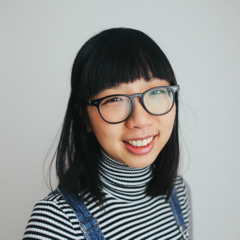
Lorraine Chuen
Law students wear many hats, and at Osgoode, many students also wear the hat of being community organizers. I had the honour of interviewing 12 JD students about their involvement in various social justice movements and community initiatives this past year. Here is an overview of their work.
Lorraine Chuen (1L) is a writer, zine-maker, and graphic designer interested in building community power around racial justice and digital justice in Toronto. She highlighted her organizing work with a group called Friends of Chinatown Toronto (FOCT), comprising writers, artists, architects, business owners, residents and community activists fighting back against the impacts of gentrification in downtown Chinatown. Lorraine has also been involved in co-organizing IntersectTO, an online and offline community in Toronto for Black, Indigenous, and people of colour (BIPOC) folks interested in tech, design, and digital justice.
She explained the goals of each movement.
“FOCT’s goals [are] to fight for community-controlled affordable housing, economic justice, and racial justice in Toronto’s downtown Chinatown. Most recently, we’ve been speaking up against Toronto Police Services’ plan to install new CCTV surveillance cameras in Chinatown, Alexandra Park and Kensington Market. We’re concerned about the disproportionate effects that heightened police presence will have on poor and racialized communities in these neighbourhoods.”
“We’re also putting energy into connecting with older Chinatown residents. We recognize it’s important to build relationships if we want to be engaging in intergenerational organizing. Last month, we had a community mah-jong tournament to connect with some of the Chinese seniors at Cecil Community Centre.”
“Finally, a big part of our organizing has been in response to a proposed mid-rise development at 315-325 Spadina. We’ve spoken out against the lack of accessible and consensual community consultation and are currently pushing for affordable housing units for low-income seniors and families to be centred in the development process. We’re also beginning to learn more about alternative models for community-controlled housing, like community land trusts – that’s a longer-term goal we might be interested in working towards in the future!”
“In terms of IntersectTO—our group was created as a response to Toronto’s very white tech and design scenes, which can be very alienating for BIPOC. Even conversations around “diversity and inclusion” in tech are typically depoliticized and made palatable for a white audience. We wanted to do something different and hold space for conversations that acknowledge how tech and data are political issues: they affect racialized folks in disproportionate and unique ways. This includes the way that police are using surveillance tech in Black and brown neighbourhoods, or the way facial recognition performs more poorly on darker skin tones, or the fact that tech giants like Amazon are providing the tech and data infrastructure for Immigrations and Customs Enforcement in the U.S. Our online group, and all our in-person events are closed to BIPOC, so community members can have candid conversations about race in a safer environment. More broadly, our community goals are also around building relationships, sharing tech and design knowledge with one another, mentorship, and collaborating on projects.”
In terms of her perspective on the relationship between community work and law school, Lorraine said: “community work keeps me grounded as a law student; it’s a reality check about the bigger issues that are unravelling in the world around us while we’re stressing about readings and exams. It reminds me that there’s so much more complexity in the world than what we’re learning about in the classroom. The underlying competitive, corporate culture at Osgoode can feel quite unhealthy. Being in community, around people I look up to and learn from, and to be in a place where I can learn to more deeply live my politics is really energizing and lovely.”
She continued, “It’s important to remember that law is just one tool out of a wider toolbox. We need to enter community spaces with humility and recognize how much we have to learn from community members, residents, organizers, and artists outside the classroom. A lot of times this means taking off our ‘law school hat’ and recognizing there are other ways we can show up in community.”
“I think there is such a thing as a law student saviour complex, and I think it can be really harmful when law students coming from places of privilege position themselves as experts. Law students often don’t know what’s best for the community and run the risk of erasing knowledge coming from the lived experiences of folks most directly impacted.”
“Finally, if we insist on keeping our social justice work ‘legal’, we’re narrowing our own understanding of how we see ourselves in relation to community. It’s a disservice to ourselves to define ourselves by our profession, rather than by our relations, and at the end of the day, we are so much more than just law students!”
